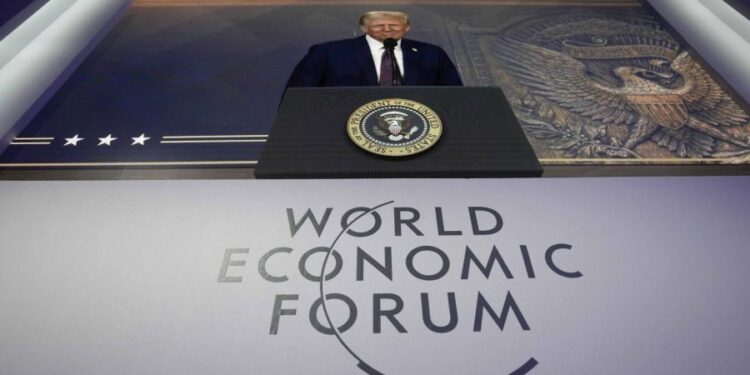
President Trump said Thursday he’s working with Democrats on extending and building off of his 2017 tax cuts — one of the top legislative priorities for Republicans, who are split on many of the law’s wide-ranging provisions.
During an event in Davos, Switzerland, Trump suggested that passing another major tax package hinges on Democratic support, even as Republican lawmakers look to advance his agenda through a budget process that would allow the GOP to sidestep Democrats.
“We’re working with the Democrats on getting an extension of the original Trump tax cuts,” Trump said, speaking to a group of CEOs and investors.
“When we do the renewal of the Trump tax [cuts], we have to get Democrats to approve it. If the Democrats didn’t approve it, I don’t know how they can survive with about a 45 percent tax increase,” he said.
Trump said he would like to lower the corporate income tax rate from 21 percent — the level set in the 2017 Tax Cuts and Jobs Act — to 15 percent for businesses that make products in the U.S.
He also called for renewing cuts to personal income tax rates that will expire at the end of the year without action from Congress.
Trump’s comments raised questions about how Republicans plan to advance a tax package along with the rest of the GOP agenda.
Republicans plan to use the budget reconciliation process to pass their legislative agenda without needing Democratic support. Budget reconciliation measures can pass the Senate with a simple majority, averting the prospect of a Democratic filibuster and the need to make concessions.
The president and some GOP lawmakers have called for including tax cuts in a larger bill that would also include policies on energy, immigration and defense. But top Republican senators have suggested moving a bill with energy and immigration policies first to secure an early win before moving to a tax bill.
While some Democrats could be swayed to support a bipartisan tax package, Republicans are unlikely to secure significant bipartisan buy-in for other policies that could be included.
There is also a general standoff among Republicans between budget hawks, who are seeking major spending cuts to go along with a tax package, and other members of the conference who are focused primarily on extending lower tax rates.
Republicans also hold a wide range of views on controversial provisions like the state and local tax (SALT) deduction cap, which Republicans limited to $10,000 in 2017, as well as green energy credits in Democrats’ Inflation Reduction Act (IRA).
Republicans in higher tax blue states detest the SALT cap, while many Republicans support the effects the IRA credits are having on their local economies and don’t want to see them repealed.
Democrats have expressed some interest in working with Republicans on tax cuts, including House Minority Leader Hakeem Jeffries (N.Y.) and Ways and Means Committee member Rep. Gwen Moore (Wis.).
Moore told The Hill there’s Democratic interest in the research and development tax credit, and Jeffries has expressed support for low income housing tax credits, among others.
But Jeffries said Thursday that Trump had not reached out about a tax deal to Democrats. He added that his caucus does not approve of the Republican approach to make budget cuts while delivering tax cuts that he sees as skewed to the wealthy.
“The Republicans have not opened any line of communication with us,” Jeffries said Thursday.
“Extreme MAGA Republicans want to enact massive tax cuts for billionaires and wealthy corporations and stick working class Americans with the bill. We’re not down with that approach.”
Updated at 1:50 p.m. EST.







